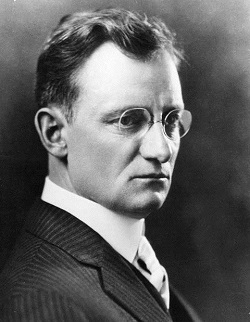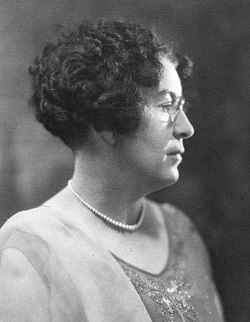 Claude E. Ingalls was born on a farm near Bristow, Iowa, on August 22, 1877. The family moved to Vancouver, Washington, where Claude started his schooling. His mother died during his childhood, so Claude went to live with his grandparents on their farm near West Bend, Wisconsin. He worked on the farm and continued school, “acquiring a violent fondness for life in town,” as he later stated. At the age of fifteen, Claude moved with his grandparents to Washington, Kansas, studying at home as well as clerking and working on the farm. He graduated from Washington High School in 1897 and became a high school teacher of Latin and English. Claude earned his law degree in 1903.
Claude E. Ingalls was born on a farm near Bristow, Iowa, on August 22, 1877. The family moved to Vancouver, Washington, where Claude started his schooling. His mother died during his childhood, so Claude went to live with his grandparents on their farm near West Bend, Wisconsin. He worked on the farm and continued school, “acquiring a violent fondness for life in town,” as he later stated. At the age of fifteen, Claude moved with his grandparents to Washington, Kansas, studying at home as well as clerking and working on the farm. He graduated from Washington High School in 1897 and became a high school teacher of Latin and English. Claude earned his law degree in 1903.
 Elizabeth Eleanor Caldwell was born in Dwight, Illinois, September 18, 1879. Her family moved to Washington, Kansas, when she was only a few years old. After her mother’s death, she moved to Zanesville, Ohio, to live with her grandparents and graduated from Zanesville High School. Eleanor attended Putman Seminary, Ohio Wesleyan University and the University of Illinois earning bachelor’s degrees in arts and in literature. Elizabeth traveled abroad in 1905 followed her college years, and she wrote a small book, recording her observations of her six months’ tour of Europe.
Elizabeth Eleanor Caldwell was born in Dwight, Illinois, September 18, 1879. Her family moved to Washington, Kansas, when she was only a few years old. After her mother’s death, she moved to Zanesville, Ohio, to live with her grandparents and graduated from Zanesville High School. Eleanor attended Putman Seminary, Ohio Wesleyan University and the University of Illinois earning bachelor’s degrees in arts and in literature. Elizabeth traveled abroad in 1905 followed her college years, and she wrote a small book, recording her observations of her six months’ tour of Europe.
Claude and Elizabeth married in Washington, Kansas in 1906. The couple had two children, daughter Alice and Son Robert.
Claude’s political interest exhibited itself while he was still in his teens and continued as a lifelong involvement. He acted as a delegate to the first National Convention, which nominated William Howard Taft for president. Claude was appointed postmaster by President Taft in 1910. For several years Claude abandoned the newspaper business, selling his Kansas papers in 1912, and announcing that he “quit the newspaper game forever — not enough time to go fishing.” Three years later he reversed that decision when he came west and purchased the Corvallis Gazette-Times. He had been heading to Eldorado, Kansas, to investigate the purchase of a newspaper there, but he didn’t get off the train until he reached Oregon, explaining that, “I got as far as Topeka and it was so darned hot I longed for the Pacific Coast climate which I remembered . . . the land of my youth, the rains, the big cherries and strawberries, and the beautiful mountains and valleys.” Thus he settled his family in Corvallis for the rest of his life.
In 1917 Claude was elected president of the Willamette Valley Editorial Association, and the following year became president of the Oregon State Editorial Association. He was chosen as secretary of the Republican State Central Committee in 1922. A yellowed clipping from the July 13, 1922, copy of the Portland Telegram announced the latter appointment, describing him as the “swashbuckling editor of the Corvallis Gazette-Times . . . who learned his politics in the hard-boiled, double-eyed, standpat school of Kansas.” The Telegram went on to say, “What the Corvallis man doesn’t know about the game isn’t known anywhere in the wide, wide world.
During World War I, Claude was chairman of the Benton County Council on National Defense. He became postmaster of Corvallis in 1923 and continued in this position for a number of years. Claude served in many other civic capacities, including the City Council and the Chamber of Commerce. He was a member of Patterson’s Tax Investigating Committee and was outstanding as a leader in the development of Corvallis and Oregon State College. As a charter member of Corvallis Country Club, he was influential in its development and served as its president for twenty years. He was a Scottish Rite Mason, a Shriner, a member of the Sons of the American Revolution, and Knights of Pythias.
Eleanor joined the faculty of Oregon State College in 1923 and taught English there for nearly twenty years. Dr. E.W. Warrington, head of the Department of Religion at Oregon State University and Eleanor’s friend, described her as: “a great teacher—whether at home or in the classroom. Her own children and a host of youth throughout Oregon and the adjoining states bear testimony to this. She was a teacher who was not so much a master as a friend; not a disciplinarian, but rather a chum. In her hands the subject matter offered an opportunity to introduce the students to the larger things of life.”
After some years of teaching, Eleanor earned a Master of Arts degree from Columbia University. She was coauthor with Professor Gertrude McElfresh of a book, Everyday English, and continued to teach English at Oregon State College until a few months before her death in November 1942. Eleanor was a member of the Presbyterian Church, P.E.O., The Women’s Club, Alpha Lambda Delta, A.A.U.W., The College Folk Club, and Oregon State Mother’s Club. She was on the Corvallis Library Board for many years and was well known as a toastmistress. A lover of animals, she used to rout her children out of bed at five in the morning to go to a field on the south edge of town to watch the circus unload and the elephants and “hippos” get their breakfast. Her garden was a special treasure. Though she grew tired of canning all the pears from the four backyard trees—a task that had been exciting when she first came from Kansas—she never tired of tending her flowers. During the early years of World War II, when she was a member of Pro-America, she spent considerable time tending a red, white, and blue flower bed.
Long before she was an English teacher, one of Eleanor’s loves was literature, with considerable emphasis on Shakespeare. She and her daughter would prop a copy of Macbeth or Hamlet over the kitchen sink and learn passage after passage while they washed and dried the dishes together. Whenever a nationally or internationally known Shakespearean actor would get as close as Eugene or Portland, an exception was made to the rule that grade school children should go to bed early, and off the family would go to watch Fritz Leiber or Sir Philip Ben Greet. (Her daughter has made a donation of Shakespearean books to the OSU Library in recognition of this interest and a gift to the city library because of her constant concern over its progress long before the present building was started.) One of her most outstanding traits was probably her delightful sense of humor. Long after her death, friends would quote funny little things she had said on the spur of the moment. A woman of talent, ambition, and sunny disposition, Eleanor Ingalls served family, college, and community in generous measures. Dean Ralph Colby, in a memorial printed in The Lamplighter, conveyed the esteem and devotion she had inspired in these words: “And through all the years she gathered a host of varied friends, who delighted in her humor, admired her good-natured honesty, and simply liked her for what she genuinely was.”
Claude E. Ingalls died August 8, 1950, at the age of seventy-two, a prominent and respected man. The editorial tributes paid him by his colleagues throughout the state lauded his individualism, his fearlessness in being outspoken, his personal dedication to his strong beliefs and his outstanding ability as a scholarly journalist. A tribute from his friend and business associate, Governor Charles A. Sprague, quoted here in part in the Salem Statesman on August 10, 1950, conveyed the feelings of his fellow journalists: “Loyalty and courage were badges appropriate to Claude Ingalls….He scorned sham and hypocrisy. He fought ceaselessly against forces which he thought were destroying the country. He would not hedge or equivocate in stating his convictions even though some subscribers might grow irate over what he wrote. During his long tenure as editor of the Corvallis Gazette-Times he enjoyed complete freedom of expression; and his reputation as a fearless editor and able writer went far beyond the Gazette-Times’ normal circulation area.
